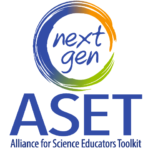
Assessment
Overview
Your assessments should be designed to assess the extent to which students have mastered the learning objectives and the extent to which they are making progress towards the performance expectations (Bybee, 2013). Multiple and varied assessments, both formative and summative, are needed to comprehensively gauge students’ understanding of Disciplinary Core Ideas (DCIs) through the application of the Science and Engineering Practices (SEPs) and Crosscutting Concepts (CCCs) (DeBarger et al., 2015), as defined in the performance expectations for elementary, middle, and high school grade bands. To adequately cover the three dimensions of the NGSS, assessment tasks will need to contain multiple components (e.g. a set of interrelated questions) administered either together or over time.
The big shift towards integrated science teaching and learning requires assessments that not only elicit students’ knowledge of science facts, but also how students use their knowledge of Disciplinary Core Ideas, Science and Engineering Practices, and application of Crosscutting Concepts to explain science phenomena (DeBarger et al., 2015; Pellegrino et al., 2013). Thus, assessments need to include not only content-based items, but also dynamic performance-based tasks that provide opportunities for students to demonstrate mastery of knowledge in use.
When students’ performance on various assessments are examined together, it should provide a more complete picture of how well students have mastered the lesson or unit-specific learning objectives that build towards the larger performance expectation(s).
Instructions for 3-D Map
List, and briefly describe each of the assessments you plan for your unit/lesson. These assessments should align with your learning objectives. Through your assessments, you should demonstrate that you are monitoring student learning before, during, and after instruction. For a unit, it is recommended that you include plans for both formative assessments (informal and formal) and summative assessments. However, if you are mapping a lesson your assessments may only be formative.
Guiding Questions
In planning your assessments, you should ask yourself:
- What assessment tools/strategies will you use to collect evidence at the beginning, during, and/or at the end of the lesson to measure the extent to which the students have made progress toward the learning objectives?
- What does mastery of science knowledge in use (integration of DCIs, SEPs, and CCCs) on this lesson’s outcomes look like?
- How will you continually check for understanding (be specific about the formative tools/approaches you will use)?
- What are common misconceptions that might arise during this lesson or unit?
- What specific prompts or questions might help students focus attention, improve observation, and encourage reasoning? What are possible answers with which they may respond?
- How are you monitoring student ability to connect individual activities, lessons, and concepts to the overarching phenomenon? (Do you use visual scaffolds to track understanding of concepts?)
External Resources on Assessment
Link to Framework pages 260-264
NGSS Classroom Sample Assessment Tasks (embedded as part of Classroom Sample Tasks)
http://www.nap.edu/catalog/18409/developing-assessments-for-the-next-generation-science-standards
References
DeBarger, A. H., Penuel, W. R., Harris, C. J., & Kennedy, C. A. (2015, online first). Building an assessment argument to design and use next generation science assessments in efficacy studies of curriculum interventions. American Journal of Evaluation, 1098214015581707.
Pellegrino, J. W., Wilson, M., Koenig, J. A., & Beatty, A. S. (2013). Developing assessments for the Next Generation Science Standards. Washington, DC: National Academies Press.
Bybee, R. W. 2013. Translating the NGSS for Classroom Instruction. NSTA Press.
National Research Council. (2014). Developing Assessments for the Next Generation Science Standards. Committee on Developing Assessments of Science Proficiency in K-12. Board on Testing and Assessment and Board on Science Education, J.W. Pellegrino, M.R. Wilson, J.A. Koenig, and A.S. Beatty, Editors. Division of Behavioral and Social Sciences and Education. Washington, DC: The National Academies Press.
